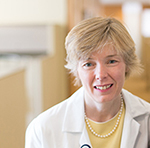Interviews

Name: Dr Eileen O’Reilly,
TCD Qualifications: M.B. (1990)
About: Dr O’Reilly is an oncologist at Memorial Sloan Kettering whose research and clinical activities focus on treating patients with pancreatic and hepatobiliary malignancies. Eileen met her Lebanese husband Dr Ghassan Abou-Alfa in Memorial Sloan Kettering, where he works as an oncologist treating patients with gastrointestinal cancers. Eileen and Ghassan are generous supporters of Trinity’s exchange programme with the American University of Beirut.
What made you decide to study medicine at Trinity?
I wanted to study medicine, in a way following the footsteps of many physicians in my family – aunts and uncles, who made me very interested in Medicine and whom were very supportive of this career choice. I also really wished to attend Trinity as it is such a historic educational institution and to me at the time, and still now, was an extraordinary opportunity that I felt very privileged to avail off. I loved my time there and in particular the year in residence in Trinity in my final year of medical school, is a time that I very fondly look back on.
Who was your role model during your student days?
The main role models that I had were Professor Peter Daly (Oncology, St James Hospital) and at a later time point during training – Dr John Crown (Oncology, St Vincent’s Hospital). Both were an inspiration with their knowledge, thoroughness, thoughtfulness and resolution to solve a problem and both were major forces of change for Oncology in Ireland.
What led you to move to the USA?
I moved to the US to undertake a Fellowship in Medical Oncology at Memorial Sloan Kettering Cancer Center (MSKCC). Dr John Crown had just returned to Ireland and I was his first registrar at St. Vincent’s hospital. He very strongly encouraged me to seek oncology and sub-speciality training in the US and for this I am ever grateful! At the time, my family had not been touched by cancer, although, several close members have sadly succumbed in recent years and it only further underscores the motivation and wish to effect change.
How did you choose your area of specialisation?
I loved oncology from the very first moment that I was introduced to it – 'hospital 1 top floor' under the direction of Professor Peter Daly at the time! The innovation, rate of change of knowledge, opportunity to develop a career and extraordinary progress in many malignancies then and now, has only further underscored my enthusiasm and love for a career in this field. Oncology embraces the core principles of medicine: human interaction when patients and families are often at their most vulnerable along with cutting-edge science and a recognition of our need to be humble in a field with many unpredictabilities.
What has been your proudest moment in your medical career to date?
The proudest moment in my medical career to date – was undoubtedly the day I graduated from TCD in 1990! I was the first in my immediate family to graduate from Trinity (other family members had graduated from UCC and UCD), although my brother in a different discipline was shortly to follow, and I believe my parents at the time were very touched. A close second was hearing that I had been accepted for an oncology Fellowship position at MSKCC in New York. New York is my adopted home and is where I met my husband and where we now raise our own family.
What advice would you give to medical students?
For medical students, I would encourage you to pursue what you love, to avail of opportunities to learn, to travel and see the world and to be culturally sensitive and to remember that at the end of the day, the most important thing is the person (patient) before us and how we can do best by them.
September 14-19th is Cancer Week Ireland. What is the main message to convey to the public, in your opinion?
For Cancer Week in Ireland, important messages are ones of awareness and education and to seek expertise. Repeatedly in cancer care specialisation has been demonstrated to improve outcomes and this is an important point that is not always recognised. Fortunately access to excellent oncology care in Ireland is now widely available, but occasionally a second set of eyes on a problem can often add valuable insight, particularly in rare malignancies or in the setting of unusual circumstances of common cancers.
What motivated Ghassan and you in your decision provide funds for supporting an exchange programme for medical students between Trinity and the American University of Beirut?
Ghassan, my husband, is a medical oncologist too. We are very lucky to work together. We have both enormously benefitted from an outstanding undergraduate education in medicine in the respective universities of our home countries – for Ghassan: American University of Beirut (AUB) in Lebanon and for me: Trinity in Dublin. In a small way, we are delighted to have the opportunity to facilitate an international educational endeavour that supports medical student exchange between the two medical schools.
For the events of Cancer Week at Trinity College Dublin please click here

